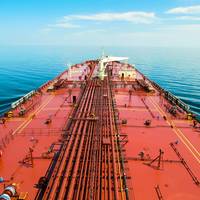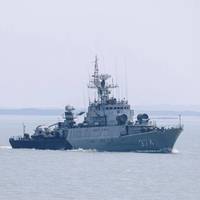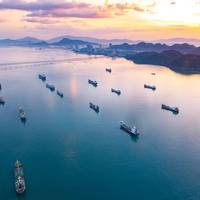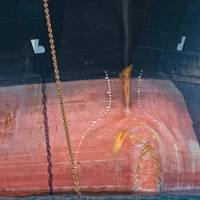Reliance Refusing Sovcomflot Oil Shipments

India's Reliance Industries, operator of the world's biggest refining complex, will not buy Russian oil loaded on tankers operated by shipping company Sovcomflot (SCF) after recent U.S. sanctions, according to two sources familiar with the matter.The development adds to oil export problems for Russia as its oil firms may face difficulties finding ships to sell surplus oil after recent Ukrainian drone attacks on the state's refineries. Russian companies are already struggling to collect payments for oil exports due to banking restrictions.The U.S.
Indonesia Deploys Navy Ships to Thwart Ilegal Shipments of Refined Palm Oil

Indonesia deployed navy ships and hundreds of personnel on Wednesday, including intelligence assets, in an effort to thwart illegal shipments of refined palm oil olein, just hours away from an export ban aimed at taming surging cooking oil prices.The new rules were due to take effect at midnight local time (1700 GMT), and the navy and other agencies had been instructed to step up patrols of Indonesian waters to ensure compliance, said navy spokesperson Julius Widjojono.Palm oil futures on the Malaysia exchange surged by 9.8% on Wednesday…
Oil Barrels Come Off the Water as Storage Boom at Sea Fades

Tens of millions of barrels of crude and oil products stored on tankers at sea due to the coronavirus crisis are being sold, in a sign fuel demand is recovering as lockdowns ease, shipping sources say.Fuel demand tumbled as much 30% from March to May, with some surplus stored at sea as land storage filled up.Crude held on tankers fell below 150 million barrels by the end of June, down from more than 180 million barrels in late April, IHS Markit estimated.Refined products held on vessels dropped to 50 million barrels from a mid-May peak close to 75 million barrels…
Pandemic Forces Virtual Safety Checks for Oil Tankers

Ship assessors are resorting to virtual inspections of oil tankers to keep vessels afloat, as the coronavirus pandemic makes physical visits to check for seaworthiness tougher and a slump in fuel demand increases the need for ships as storage.Oil tankers require rigorous inspections twice a year to reduce the risk of oil spills or mechanical collapse with polluting cargoes onboard.But the global pandemic has disrupted international trade, leaving merchant seafarers stuck on ships…
Iran Floats Surplus Oil as Demand Falls Ahead of US Sanctions
Two tankers carrying Iranian condensate, a type of ultra-light oil, have been floating off the United Arab Emirates for about a month as demand for the oil fell ahead of U.S. sanctions.The tankers, carrying about 2.4 million barrels of South Pars condensate combined, have been floating off the UAE since August after South Korea halted imports from Iran while China's demand dropped during summer, according to several industry sources and shipping data.The build-up in Iranian oil supplies underscores the pressure that Iran is facing as Washington aims to bring Iranian oil exports down to zero to force Tehran to re-negotiate a nuclear deal.The Very Large Crude Carrier (VLCC) Felicity loaded condensate at Iran's Assaluyeh port in early August and then set ail for Jebel Ali in the UAE…
Russia Could Take 2-5 Months to Exit Oil Output Deal
Russian Energy Minister Alexander Novak said on Monday it could take two to five months to exit a global oil output cut deal with OPEC and non-OPEC countries if and when such a decision was taken, the Interfax news agency reported. Global producers late last year extended a global oil output cut deal between members of the Organization of the Petroleum Exporting Countries and non-OPEC states until the end of 2018. The duration of that deal is expected to be reviewed at OPEC's next meeting in June when member countries will consider the current oil price and forecast prices when considering what action, if any, to take. "It could take three, four, five months or maybe just two (to exit the deal)," Novak said in an interview with Interfax.
Oil Below $40/bbl After Rise in US Oil Rigs
U.S. crude oil prices on Friday dove below $40 a barrel for the first time since the 2009 financial crisis, notching their longest weekly losing streak in 29 years after a further rise in U.S. drilling and a drop in Chinese manufacturing. Oil prices pushed briefly below the $40-pivot mark following weekly data that showed U.S. energy firms added two oil drilling rigs last week, the fifth increase in a row. The rise in rigs, which is emerging now after a second quarter lull in prices, is adding to concerns U.S. shale production is proving slow to respond to falling prices, prolonging a global glut. "Everyone is still looking at it saying 'Wow, you still don't have production coming down,'" said Tariq Zahir, founder at Tyche Capital in Laurel Hollow, New York.
Petrobras Could save $18K mln between 2015 and 2021
Brazil's Petrobras estimates it will save costs for 18,000 million dollars between 2015 and 2021 findings with direct contracting to explore four oil surplus subsalt areas of the country, the company said Friday . The company expects investment required would be for about 26,000 million dollars to acquire areas, discover and define the potential surplus oil, according to a filing with the Securities and Exchange Commission (CVM). The presentation was used this afternoon by the president of Petrobras, Maria das Graças Foster, in a meeting with analysts at the headquarters of the state company in Rio de Janeiro. On Tuesday, the National Energy Policy Council (CNPE) Petrobras chose to remove…
EIA: Would More Crude Oil Help?
Yesterday (April 27), the Center for Strategic and International Studies (CSIS) and the U.S.-Saudi Arabian Business Council co-hosted a conference on “U.S.-Saudi Relations and Global Energy Security.” At this conference, as he has stated recently in other venues, the Saudi Arabian Minister of Petroleum and Mineral Resources, Ali al-Naimi, stated that, “There is no general shortage of crude oil in today's market -- supplies are readily available.” The Saudi Arabian minister pointed to the “balkanized gasoline markets” and a shortage in U.S. refining capacity as reasons why gasoline prices are high in the United States. But the U.S. Deputy Secretary of Energy, Kyle McSlarrow, stated at the same conference that crude oil prices are “the driver” in the recent rise in gasoline prices.
IEA: Expressing Concern Over Tight Oil Supply
At a scheduled meeting today, the Governing Board of the International Energy Agency discussed the current restraints on world oil supply, the significant decline in oil stocks worldwide and the sharp rise in oil prices. They expressed concern that the tightening supply situation could feed inflation and slow economic growth, thereby giving rise to problems particularly for developing countries. “Such instability would be in no one’s interest,” said Robert Priddle, Executive Director of the Agency. The Board noted that industry oil stocks worldwide were lower at the end of last year than at any time in the past decade. Yet demand is constantly growing.
IEA Concerned By Tight Oil Supply
The Governing Board of the International Energy Agency last week discussed the current restraints on world oil supply, the significant decline in oil stocks worldwide and the sharp rise in oil prices. They expressed concern that the tightening supply situation could feed inflation and slow economic growth, thereby giving rise to problems particularly for developing countries. The Board noted that industry oil stocks worldwide were lower at the end of last year than at any time in the past decade. Yet demand is constantly growing. The present gap between demand and supply means that no surplus oil is available to build stocks and that they continue to be drawn down to meet current requirements.





